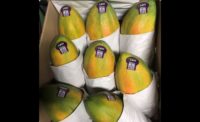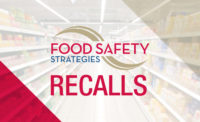Food Safety
Peaches in salmonella recall reached 14 other countries
Major grocery chains across U.S. already pulled bagged and loose peaches supplied by Wawona

Peaches recalled this summer in a salmonella outbreak in the U.S. were shipped around the world too.
Peaches recalled across the U.S. for potential salmonella contamination went to 14 other countries.
The FDA is sharing distribution information with food safety authorities in those locations: Australia, Canada, China, Costa Rica, Ecuador, El Salvador, Guatemala, Honduras, Mexico, Panama, the Philippines, Singapore, Taiwan and the United Arab Emirates. Canada, Singapore and New Zealand have issued recalls of peaches from Prima Wawona in Fresno, Calif.
The FDA is continuing its traceback investigation to try to identify the source of the ongoing outbreak and to determine whether additional peaches are affected.
Earlier this month, Prima Wawona recalled bagged and loose peaches sold at retailers nationwide throughout June, July and the first few days of August.
Supermarkets sold the bagged peaches with the following product codes on the bottom of the packages:
- Wawona Peaches – 033383322001
- Wawona Organic Peaches – 849315000400
- Prima Peaches – 766342325903
- Organic Marketside Peaches – 849315000400
- Kroger Peaches – 011110181749
- Wegmans Peaches – 077890490488
Retailers that received recalled peaches from Prima Wawona or Wawona Packing Company include, but are not limited to:
- ALDI
- Food Lion
- Hannaford
- Kroger, including the following affiliated retailers:
- Jay-C
- King Soopers
- City Market
- Fry's
- Ralphs
- Food 4 Less
- Foods Co.
- Smiths
- Target
- Walmart
- Wegmans (Wegmans is also recalling in-store bakery items containing the peaches.)
The bulk peaches are sold in grocery stores in a variety of formats, typically bins where consumers may select their own fruit, and they may have stickers with these PLU numbers on them: 4037, 4038, 4044, 4401, 94037, 94038, 94044, 94401. Please note that not all peaches with these PLU codes are supplied by Prima Wawona.
If you are unsure of the brand or variety of your loose peaches, contact your retailer or supplier, or throw them out, the FDA says.
The outbreak, originally detected among people who ate peaches from ALDI, has sickened 78 people in 12 states.
Whole genome sequencing analysis shows that an outbreak of Salmonella Enteritidis infections in Canada is related genetically to the U.S. outbreak, according to the CDC. “This means that people in both of these outbreaks are likely to share a common source of infection,” the agency says in its outbreak update.
Looking for a reprint of this article?
From high-res PDFs to custom plaques, order your copy today!






